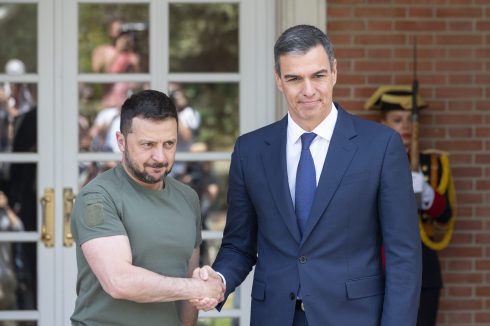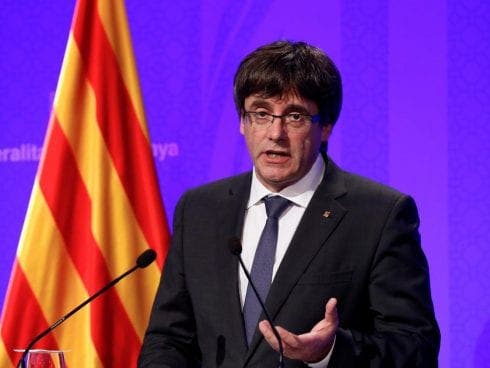VOTERS across the European Union (EU) will head to the polls this Sunday to decide who will represent each member state in the tenth European Parliament.
In Spain, all nationals and resident non-national European citizens above the age of 18 will be able to vote, electing the 61 MEPs (Members of European Parliament) who will act as the country’s representatives throughout parliament’s next term.
In total, over 450 million people across Europe will elect 720 representatives to the world’s only directly elected transnational assembly.
Migration, security amid the wars in Ukraine and Gaza, and climate are among the key issues which are defining the campaign.

Why are the European Elections important?
Sunday’s vote will elect the 61 MEPs who will represent Spain in the European Parliament, which is one of the EU’s legislative bodies alongside the European Council and European Commission.
The elections also represent the only opportunity for EU citizens to directly elect representatives.
MEPs help to set the EU’s legislative agenda, influencing how money is spent and which new laws are set.
During the last term of the European Parliament, lasting from 2019 to 2024, MEPs approved over 450 laws.
The European Parliament also approves the EU’s budget and how it is spent, which for 2024 is €189.4 billion.
The elections are also an opportunity for disgruntled citizens to voice their anger with the EU – far-right and Eurosceptic parties are expected to do well across Europe as criticism against the EU’s leaders, in particular European Commission president Ursula von der Leyen, ramps up.
Famously, UKIP and the Brexit Party both won the most seats for the United Kingdom in the 2014 and 2019 European elections respectively, signalling the change in public opinion which eventually culminated in Brexit.
Following this year’s ballot, MEPs will vote on whether to keep von der Leyen as President or elect someone new.
Tomorrow’s vote could have repercussions for global power relations with a number of parties, including progressive and far-right voices, unhappy with the levels of aid being sent to help Ukraine in their war against Russia.
So far, the EU has supplied €98.5 billion worth of aid to Ukraine since the war broke out in 2022.
Other issues include the formal recognition of Palestine, carried out by Spain, Ireland and Norway but not by any other member states, and the use of Catalan as an official language.
Junts per Catalunya leader Carles Puigdemont struck a deal with Spanish Prime Minister Pedro Sanchez to lobby for the recognition of Catalan, Basque and Galician as official EU languages in exchange for crucial votes which allowed Sanchez to become PM.

Which parties are running in the election?
The parties running for election are much the same as any traditional Spanish general election – but with one key difference.
Once in the European Parliament, each party joins transnational political groups who work together to push forward their own agenda.
These groups are: European People’s Party Group (EPP); Progressive Alliance of Socialists and Democrats (S&D); Renew Europe; Greens/European Free Alliance (Greens/EFA); Identity and Democracy (ID); The Left in the European Parliament; European Conservatives and Reformists; Non-Attached Members of the European Parliament.
Partido Popular (PP) will join the EPP, the PSOE socialists will join S&D, Sumar will either join Renew Europe or The Left, Podemos will join the Left and Vox will join the European Conservatives and Reformists alongside Italian Prime Minister Georgie Meloni’s far-right Fratelli d’Italia party.
A coalition of left-wing pro-independence parties called Ara Republiques, consisting of the Catalan ERC, Basque EH Bildu, Galician BNG and Balearic Ara Mes, will join the Greens/EFA.
Junts, the Catalan conservative pro-independence party led by Carles Puigdemont, would join the Non-Attached Members, which do not belong to one of the recognised political groups.

What happened last time?
At the last election in 2019, the PSOE came first with 21 seats, followed by the PP. The Renew Europe group, consisting of the Ciudadanos and the Basque nationalist PNV had 9 seats, whilst The Left won 6 seats. Vox won 4 seats whilst the Greens/EFA won 3 seats. The non-affiliated Junts party won 3 seats, including one for controversial Puigdemont.
Who is going to win?
Polls have consistently pointed towards the PP coming first with around 33% of the vote and 23 of the 61 available seats.
The PSOE will likely come second with around 20 seats, whilst far-right Vox are expected to come third with six or seven MEPs.
Cs are expected to return none of their current MEPs, with other parties picking up one or two MEPS.
Sumar, the new left-wing coalition, could pick up as many as four seats in their first European election.









